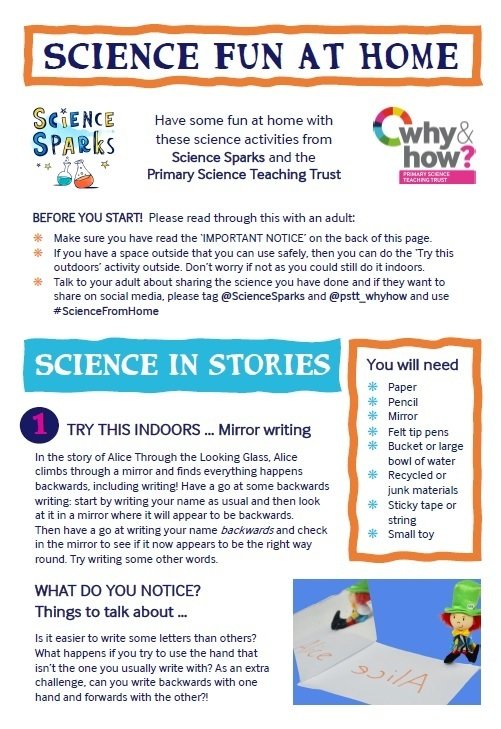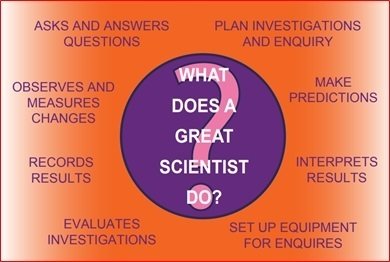Science
Science At St Maria Goretti
At St Maria Goretti we understand that Science is part of everyday life for our children today and for their future career choices. Our vision is for pupils to work independently and collaboratively in the 5 enquiry types (research, observing over time, pattern seeking, fair and comparative test and identifying and classifying) to solve problems, investigate and ask and answer questions. Science lessons are interesting, engaging and develop both knowledge and skills through practical investigations. We are proud to be one of the few schools in Stoke-on-Trent to have a science lab (Phiz Lab) but we also enjoy learning about our environment outside in our wonderful school garden, meadow and forest school area. We link science to other subjects in the curriculum where possible to ensure pupils develop a rich understanding of the world around them. Visits and workshops are regularly arranged to give all pupils first-hand experiences, embed learning and allows pupils to make connections between what they have learned in class and science in the real world.
Intent
The aim of our Science curriculum is for pupils to be independent learners, who can work together with their peers to collaborate investigate through all 5 enquiry types to ask and answer questions. Pupils and staff recognise the importance of Science in every aspect of daily life and the wide range of future career opportunities. The Scientific area of learning is concerned with increasing pupils’ knowledge and understanding of our world, and with developing skills associated with Science as a process of enquiry. It will develop the natural curiosity of the child and provide opportunities for asking and answering questions and being critical in our evaluation of evidence. We hope for the Scientific skills, understanding, knowledge and vocabulary that pupils develop at St Maria Goretti will allow them to solve problems in any situation. At St Maria Goretti, in conjunction with the aims of the National Curriculum, our Science teaching offers opportunities for children to develop scientific knowledge and conceptual understanding through the specific disciplines of Biology, Chemistry and Physics. We aim to ensure our learning is cross curricular and ensure links to STEM, reading and writing are especially evident. We endeavour to ensure that the Science curriculum we provide will give children the confidence and motivation to continue to further develop their skills into the next stage of their education and life experiences.
Implementation
At St Maria Goretti we ensure science is taught inside and outside the classroom. Teachers use the school garden, field and forest school area where possible as well as using our Phiz lab. In the science lab pupils have science lab coats and goggles and have all of the science equipment available for them to independently investigate. Teachers plan science in medium term plans for a topic block to ensure progression of skills and knowledge. Within the topic teachers ensure there is a range of assessment strategies throughout. Concept Cartoon and exporifiy are used to promote discussion in the class and allow teachers to identify misconceptions and close any gaps. TAPs focussed assessment tasks are planned within each topic to provide teachers with summative assessment criteria to solidify their ongoing teacher judgements. This is recorded termly. Lessons are focused on one of the 5 enquiry types (research, identifying and classifying, fair and comparative test, pattern seeking and observing over time). Each lesson focuses on one part of the enquiry cycle (plan, do or review). When pupils are planning an investigation they will focus on predictions, asking questions and setting up tests. When pupils are doing an investigation they will focus on observing, measuring and recording data. When pupils are reviewing an investigation they will focus on interpreting, communication and evaluating the results. This curiosity is celebrated within the classroom. Teachers planning involves creating engaging lessons, often involving high-quality resources to aid understanding of conceptual knowledge. This knowledge is built upon the skills and knowledge of previous years. Pupil’s prior knowledge will be assessed prior to teach topic block to ensure this knowledge is built on and any gaps are closed. As pupil’s the children’s knowledge and understanding increases, and they become more proficient in selecting, using scientific vocabulary, using scientific equipment, collating and interpreting results, they become increasingly confident in their growing ability to come to conclusions based on real evidence. Pupils learning in enhanced by linking concepts to real life where possible to improve pupil’s science capital. This can be through linking to home-life, having experts into school or school trips.
Impact
Out science curriculum results in an engaging, high-quality science education, that provides children with the foundations for understanding the world. Pupils are encouraged to overcome problems on their own or in groups. Pupils are encouraged to express opinions in asking questions or group discussions. They are encourage to express creativity in recording in a range of ways. This is scaffolded with resources (such as the plan, do, review posters) to guided pupils to find their own answers. Pupils are supported to work collaboratively with the use of role cards to ensure each person in the group has a task and everyone can contribute. Our engagement with the local environment ensures that children learn through varied and first hand experiences of the world around them. Science lends itself to outdoor learning and so we provide children with opportunities to experience this.
Wider curriculum
Pupils will use scientific skills in all curriculum areas as problem solving and research skills are used throughout school life. Other STEM subjects (Computing, DT and Maths) have many opportunities to use scientific skills such as recording data using ICT, testing the best material to use in DT etc. Pupils are encouraged to find career links with their learning within lessons and how the skills they are learning now will be useful in the future. This is also promoted through various workshops, trips and interactions with expert’s children have the understanding that science has changed our lives and that it is vital to the world’s future prosperity. Children learn the possibilities for careers in science as a result of our community links and connection with national agencies such as UKFast, Ogden Trust, STEM, Science across the City etc.
'We would love to see your science fun at home!
Please send a video or photograph of you and your family taking part in one of these activities'

Our Core Science Principles:
Our core science principles were developed and agreed by pupils and staff. They show the way we feel Science should be taught across our school.
We believe science is good when….
- Pupils lead their learning
- Pupils ask questions
- Pupils investigate and use enquiry skills to solve problems
- Science lessons use our environment
- Science links to real life and STEM careers
s.
Careers Links:
Through our links with local and national businesses, we are able to provide our pupils with a range of opportunities to engage with industry professionals throughout our careers curriculum. This includes visits such as: Chester Zoo; St Thomas More, Animal Farm; hedgehog rescue; Health Visitors; NHS workers and Paramedics; The Rotary Club; garden and planting workshop and a trip to the Roaches.
Science can lead to a wide range of careers. Such as:
- Teacher
- Astronaut/ astronomer (study or conduct experiments about space and the universe)
- Biologist (study living things and plants)
- Animal technician/vet/ rescue worker
- Acoustic consultant (manages noise and sound)
- Biochemist (investigating viruses and bacteria)
- Chemical Engineer (turns raw materials into everyday objects)
- Climate Scientist( study the influences on Earth’s climate and how it’s changing)
- Electronics Engineer (design and develop systems such as mobile technology and aerospace.)
Parental Engagement:
Watch Me Learn sessions provide opportunities for parents to become involved in their child’s science learning. This may be through a cross-curricular approach where parents are able to observe the ways in which pupils utilise science skills and enquiry in other areas of the curriculum, discrete science lessons or careers sessions which makes links to science skills used in a wide range of jobs.
As part of the Primary Science Capital Project KS1 have been finding science at home and bringing it into school, taking a photograph or drawing in Learning Log Books.
Here are some examples of parent engagement:
During our STEM and Careers events, there are also often opportunities for parents to join in with our learning and even volunteer to share their careers to inspire our children as the workforce of the future!
Parental Support:
Please find below a range of Science resources that will allow your child to continue their learning at home.
Virtual Tours
- Live animals webcams
- ExploreAmerican National Parks
- Visit the online collection from the Smithsonian National Air and Space Museum
- Virtual Chester Zoo https://www.chesterzoo.org/virtual-zoo-2/
Children’s Activity Corner
All Pupils
- Dr Chips: 'Daily' doses of science, engineering and computing activities to try at home
- Let's Go Live with Maddie and Greg: live lessons on a variety of science topics
- Glasgow Science Centre: bringing a bit of science into your home every day at 10am
- Science Museum: learning resources
- STEM Learning: activities to do at home
- IOP Moon Adventure: What's it like to be an astronaut? Where did the Moon come from? What's the future of humans in space?
- Science Sparks: experiments for children
- Cracking ideas: teaching and learning resources
- NASA Kids' Club
- ASE: special coronavirus resources portal
- Dr Jo Science Solutions
EYFS
- Science Talk: help children (EYFS) develop their own scientific ideas with Science Talk from The Ogden Trust
KS1
- BBC Bitesize: daily lessons
- IOP Marvin and Milo: activities to try at home
- ExpeRimental: a series of short films making it fun, easy and cheap to do science experiments at home with your children
KS2
- Wow Science: searching out the best primary activities
- CREST At Home Challenge: challenges and project ideas to do at home
- Whizz Pop Bang: free science activities for home learning
- Resources from The Ogden Trust: curriculum resources for teaching, learning and working scientifically, as well as How to guides to help you encourage and develop physics at your school
- NASA Kids' Club
- Jodrell Bank: science learning at home
- BBC Stargazing live: activity pack
Science Skills
In school we use a Plan, Do, Review format of breaking up an investigation into smaller parts.





















